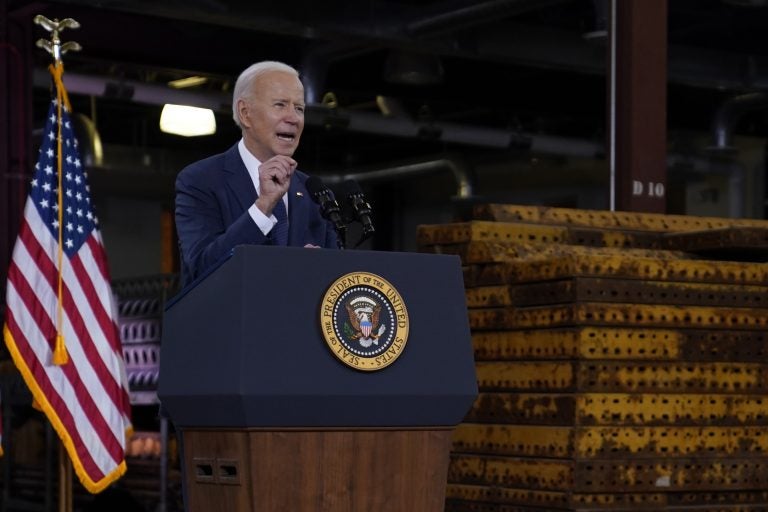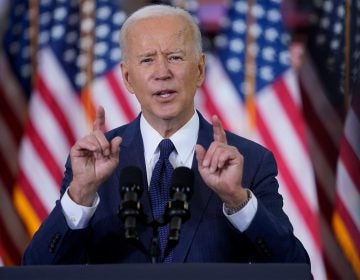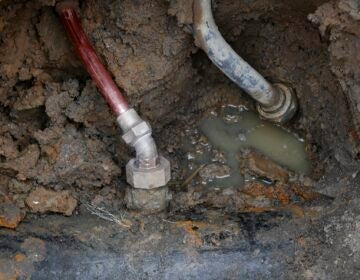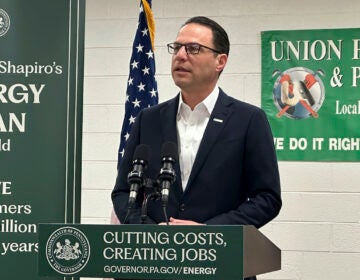Biden’s climate-focused infrastructure plan geared to curb U.S. carbon emissions
The plan, which Biden unveiled Wednesday in Pittsburgh, includes money for projects to reduce greenhouse gases in transportation, electricity and housing.

President Joe Biden delivers a speech on infrastructure spending at Carpenters Pittsburgh Training Center, Wednesday, March 31, 2021, in Pittsburgh. (AP Photo/Evan Vucci)
This story originally appeared on StateImpact Pennsylvania.
___
Environmental groups said climate provisions in President Joe Biden’s $2 trillion infrastructure plan would ease the transition to clean energy in Pennsylvania. The state’s oil and gas industry did not see much it liked in the plan.
The plan, which Biden unveiled Wednesday in Pittsburgh, includes money for projects to reduce greenhouse gases in transportation, electricity and housing. It includes billions of dollars to fund clean energy research and development, electrify cars and trucks, and modernize the electric grid to better use renewable energy.
“I’m convinced that if we act now, in 50 years people are going to look back and say this is the moment when America won the future,” Biden said.
PennFuture President and CEO Jacquelyn Bonomo said in a statement that Biden’s plan “will supercharge the transition with historic public investments that put communities and workers first.”
There is money in the plan to expand clean energy manufacturing around the country, and calls for $16 billion to plug old oil and gas wells and clean up abandoned mines.
Pennsylvania has up to half a million abandoned oil and gas wells, which emit methane gas, and 5,000 miles of streams polluted by abandoned mines.
Veronica Coptis of the Center for Coalfield Justice said that money for cleanup could keep those involved in energy extraction employed during a transition to clean energy.
“President Biden’s plan to invest in reclamation is needed and critical in our communities and also is an easy way to keep energy workers who are being displaced from the shift to a cleaner energy economy and employed through cleaning up the legacy cost that’s been left behind,” she said.
Coptis said the plan was a good “down payment” to pay for decades of disinvestment in rural communities that have provided much of the country with energy.
“President Biden’s infrastructure plan is just a huge and critically needed first step to start investing in our communities. We’ve suffered from crumbling infrastructure for decades,” Coptis said.
While broadly positive about the plan, Coptis said Congress should do even more to invest in clean energy.
“The scope and standard in this plan are great and are including very critical needs of our communities, like broadband access, increased reclamation of the legacy costs (of coal and oil and gas),” Coptis said. “But we also know we’re going to need Congress to go even bigger.”
Two-thirds of Americans said last year they wanted the government to do more to deal with climate change.
Scientists say to avoid the worst impact of climate change, we need to rapidly lower the amount of greenhouse gas pollution, mainly from using oil, gas and coal.
Oil and gas groups said the plan should have included more money for pipelines and related projects.
“Natural gas infrastructure is fundamental to ensuring good-paying, union jobs as well as continued global leadership on environmental improvements,” Marcellus Shale Coalition President Dave Callahan said in a statement. “We expect President Biden to recognize the importance of local and interstate natural gas pipelines, energy export terminals, and… modern natural gas power plants in the broad infrastructure package.”
Gene Barr of the Pennsylvania Chamber of Business and Industry said he supports money for R&D to develop new industries, and rural broadband. But Barr, a supporter of the state’s natural gas industry, said he is worried the plan leaned too heavily on renewables like wind and solar.
“I think I would be very cautious about being unduly prescriptive in terms of the kinds of energy that you’re going to use,” he said. “Trust the people who are in the energy sector to make the best decisions. They’ve got a vested interest in complying with consumer demand and trying to reduce CO2 emissions, too.”
Barr said he didn’t want the U.S. to raise its corporate income tax rate to pay for the plan. Biden’s plan calls for a raise of that rate to 28 percent from its current rate of 21 percent. That rate was lowered by President Donald Trump’s tax cut of 2019.
“Let’s avoid kind of whipsawing these corporate rates back and forth and making the U.S. into an uncompetitive tax situation again,” Barr said.
WHYY is your source for fact-based, in-depth journalism and information. As a nonprofit organization, we rely on financial support from readers like you. Please give today.






